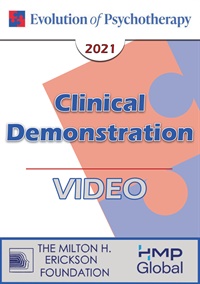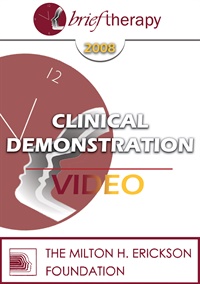- Average Rating:
- Not yet rated
- Topic Areas:
- Acceptance and Commitment Therapy (ACT) | Clinical Demonstrations
- Categories:
- Evolution of Psychotherapy | Evolution of Psychotherapy 2021
- Faculty:
- Steven Hayes, PhD
- Course Levels:
- Master Degree or Higher in Health-Related Field
- Duration:
- 1 hour
- Format:
- Audio and Video
- Original Program Date:
- Dec 01, 2021
- Short Description:
- In this demonstration I will show how therapists can apply the psychological flexibility model to go anywhere within the model at any time with anyone and still do good work.
- Price:
- $59.00 - Base Price
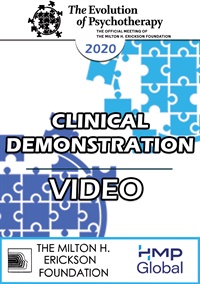
- Average Rating:
- Not yet rated
- Topic Areas:
- Cognitive Behavior Therapy (CBT) | Clinical Demonstrations | Psychology | Psychotherapy | Acceptance and Commitment Therapy (ACT)
- Categories:
- Evolution of Psychotherapy | Evolution of Psychotherapy 2020
- Faculty:
- Steven Hayes, PhD
- Course Levels:
- Master Degree or Higher in Health-Related Field
- Duration:
- 1 hour
- Format:
- Audio and Video
- Original Program Date:
- Dec 12, 2020
- Short Description:
- In this short series of actual client "real plays" I will show what process-based ACT looks like, and relate clinical methods to the psychological flexibility model as integrating into a multi-dimensional, multi-level extended evolutionary meta-model.
- Price:
-
Sale is $29.00
price reduced from Base Price - $59.00
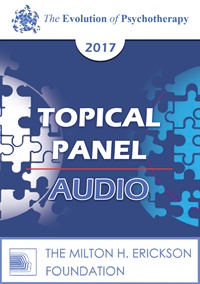
- Average Rating:
- Not yet rated
- Topic Areas:
- Topical Panels | Resistance | Psychotherapy | Therapist Development
- Categories:
- Evolution of Psychotherapy | Evolution of Psychotherapy 2017
- Faculty:
- Judith Beck, PhD | Steven Hayes, PhD | William Miller, PhD
- Duration:
- 59:01
- Format:
- Audio Only
- Original Program Date:
- Dec 15, 2017
- Short Description:
- A fresh look at what clinicians often call resistance, reframing it as a relational and motivational process rather than a client trait. Faculty consider how rigidity, ambivalence, and discord show up in therapy, and how approaches from CBT, ACT, and motivational interviewing respond differently in the moment. The discussion offers practical guidance on listening for values, increasing psychological flexibility, and adjusting therapist style to reduce stuckness and support movement toward change, especially in brief and integrated care settings.
- Price:
- $15.00 - Base Price
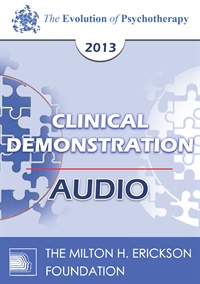
- Average Rating:
- Not yet rated
- Topic Areas:
- Clinical Demonstrations | Acceptance and Commitment Therapy (ACT) | Addiction | Depression | Psychotherapy
- Categories:
- Evolution of Psychotherapy | Evolution of Psychotherapy 2013
- Faculty:
- Steven Hayes, PhD
- Duration:
- 1 Hour
- Format:
- Audio Only
- Original Program Date:
- Dec 14, 2013
- Short Description:
- This case of complicated grieving in a young adult recovering from depression and a substance use disorder shows how perspective taking can be used to foster greater self-compassion in Acceptance and Commitment Therapy (ACT).
- Price:
- $15.00 - Base Price
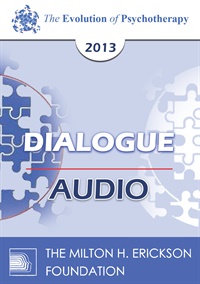
- Average Rating:
- Not yet rated
- Topic Areas:
- Psychotherapy | Dialogues | Acceptance and Commitment Therapy (ACT) | Interviewing | Motivation
- Categories:
- Evolution of Psychotherapy | Evolution of Psychotherapy 2013
- Faculty:
- Steven Hayes, PhD | William Miller, PhD
- Duration:
- 1 Hour 6 Minutes
- Format:
- Audio Only
- Original Program Date:
- Dec 13, 2013
- Short Description:
- EP13 Dialogue 12 – Acceptance & Commitment Therapy and Motivational Interviewing – Steven Hayes, PhD and William Miller, PhD Moderator: Robert Bohanske, PhD Educational Objectives: Given a topic, describe the differing approaches to psychotherapy, and identify the strengths and weaknesses of each approach.
- Price:
- $15.00 - Base Price
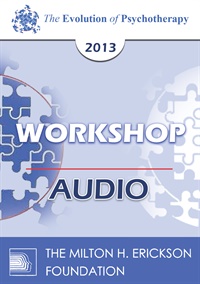
- Average Rating:
- Not yet rated
- Topic Areas:
- Psychotherapy | Workshops | Acceptance and Commitment Therapy (ACT) | Mindfulness
- Categories:
- Evolution of Psychotherapy | Evolution of Psychotherapy 2013
- Faculty:
- Steven Hayes, PhD
- Duration:
- 2 Hours 22 Minutes
- Format:
- Audio Only
- Original Program Date:
- Dec 12, 2013
- Short Description:
- This workshop will link the work in a science of perspective taking to work in mindfulness and acceptance-based psychotherapy, drawing especially on Acceptance and Commitment Therapy. Dr. Hayes will show how perspective taking can rapidly overcome barriers in psychotherapy, and when to deploy these methods.
- Price:
- $15.00 - Base Price
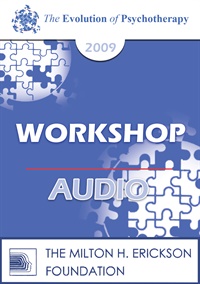
- Average Rating:
- Not yet rated
- Topic Areas:
- Workshops | Mindfulness | Acceptance and Commitment Therapy (ACT) | Psychotherapy
- Categories:
- Evolution of Psychotherapy | Evolution of Psychotherapy 2009
- Faculty:
- Steven Hayes, PhD
- Duration:
- 58 Minutes
- Format:
- Audio Only
- Original Program Date:
- Dec 13, 2009
- Short Description:
- This workshop will show how to detect and modify acceptance, mindfulness and values processes moment to moment in therapy sessions, based primarily on methods drawn from Acceptance and Commitment Therapy (ACT). The primary method used will be tape of real clinical sessions, with start and stop discussions.
- Price:
- $15.00 - Base Price
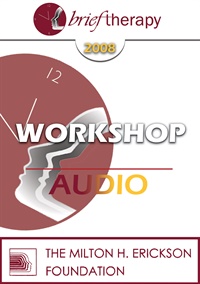
- Average Rating:
- Not yet rated
- Topic Areas:
- Workshops | Mindfulness | Acceptance and Commitment Therapy (ACT) | Therapeutic Relationship | Brief Therapy | Therapist Development
- Categories:
- Brief Therapy Conference | Brief Therapy Conference 2008
- Faculty:
- Steven Hayes, PhD
- Duration:
- 1:46:28
- Format:
- Audio Only
- Original Program Date:
- Dec 14, 2008
- Short Description:
- The evidence that the relationship matters in psychotherapy is vast, but that knowledge is of limited usefulness until it is known how to create powerful therapeutic relationships. The relevance of the Acceptance and Commitment Therapy (ACT) model to this issue is described, and specific methods are described and shown that can increase the potency of the therapeutic relationship.
- Price:
- $15.00 - Base Price
- Average Rating:
- Not yet rated
- Topic Areas:
- Clinical Demonstrations | Acceptance and Commitment Therapy (ACT) | Brief Therapy
- Categories:
- Brief Therapy Conference | Brief Therapy Conference 2008
- Faculty:
- Steven Hayes, PhD
- Course Levels:
- Master Degree or Higher in Health-Related Field
- Duration:
- 57:33
- Format:
- Audio and Video
- Original Program Date:
- Dec 13, 2008
- Short Description:
- BT08 Clinical Demonstration 06 - Acceptance and Commitment Therapy - Steven Hayes, PhD
- Price:
-
Sale is $29.00
price reduced from Base Price - $59.00
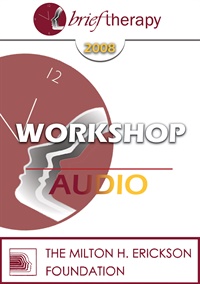
- Average Rating:
- Not yet rated
- Topic Areas:
- Workshops | Mindfulness | Acceptance and Commitment Therapy (ACT) | Brief Therapy | Therapist Development
- Categories:
- Brief Therapy Conference | Brief Therapy Conference 2008
- Faculty:
- Steven Hayes, PhD
- Duration:
- 2:40:20
- Format:
- Audio Only
- Original Program Date:
- Dec 11, 2008
- Short Description:
- Mindfulness and acceptance methods are powerful methods in clinical practice that greatly simplify the therapeutic tasks at hand. Acceptance and Commitment Therapy (ACT) will be described as an example of these methods and specific techniques will be shown. ACT targets common core processes that research are the basis for much psychopathology or restrictions on psychological health.
- Price:
- $15.00 - Base Price


